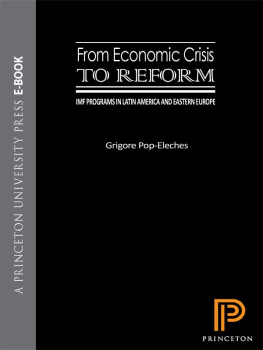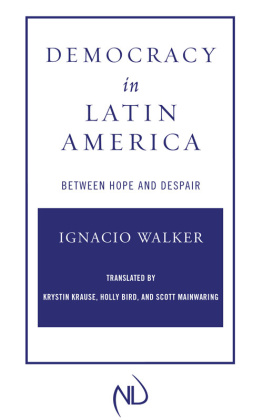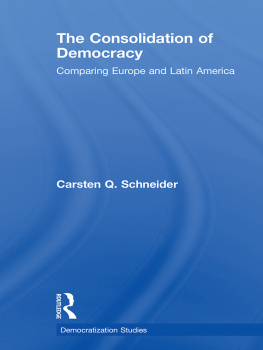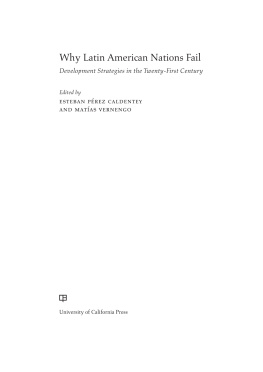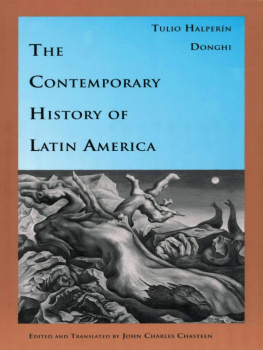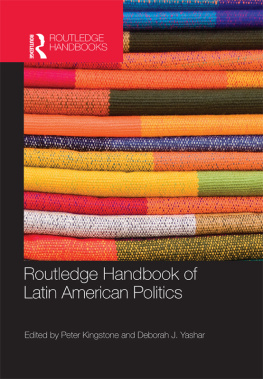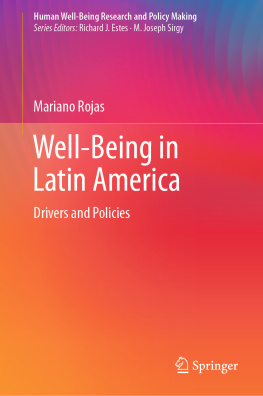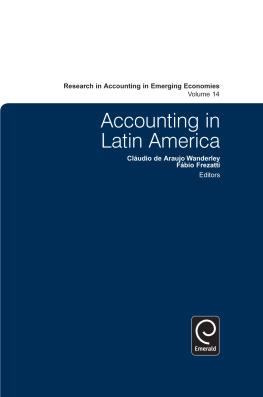What Kind of Democracy?
What Kind of Market?
Library of Congress
Cataloging-in-Publication Data
What kind of democracy? What kind of market? : Latin America in the age of neoliberalism / edited by Philip D. Oxhorn and Graciela Ducatenzeiler.
p. cm.
Includes bibliographical references and index.
ISBN 0-271-01799-6 (alk. paper)
ISBN 0-271-01800-3 (pbk. : alk. paper)
1. Latin AmericaEconomic policy.
2. Latin AmericaPolitics and government1980
3. Latin AmericaEconomic conditions1982
4. DemocracyLatin America.
I. Oxhorn, Philip.
II. Ducatenzeiler, Graciela.
HC125.W46 1998
338.98dc21 9749899
CIP
Copyright 1998
The Pennsylvania State University
All rights reserved
Printed in the United States of America
Published by
The Pennsylvania State University Press,
University Park, PA 16802-1003
It is the policy of The Pennsylvania State University Press to use acid-free paper for the first printing of all clothbound books. Publications on uncoated stock satisfy the minimum requirements of American National Standard for Information SciencesPermanence of Paper for Printed Library Materials, ANSI 239.481992.
CONTENTS
Part I:
Theoretical and Comparative Issues
Part II:
Country Case Studies: Political Parties and Social Forces
Part III:
Hybrid Regimes and Neopluralist Politics
Werner Baer is professor of economics at the University of Illinois at Urbana-Champaign. He has taught frequently in a number of Brazilian institutions, including the Fondaao Getlio Vargas and the University of So Paulo. His publications on the Brazilian economy include The Brazilian Economy: Growth and Development, which is now in its fourth edition.
Manuel Barrera has been a professor and researcher for several years at the Universidad de Chile and the Universidad Catlica de Chile. He was also founder and director of the Centro de Estudios Sociales. A specialist in labor studies and the politics of the popular sectors, his publications include Sindicatos bajo regmenes militares: Argentina, Brasil, Chile.
Luiz Carlos Bresser Pereira is professor of economics at the Fondaao Getlio Vargas. Founding editor of the Revista de Economia Poltica, he has published numerous studies in the area of political economy, including Economic Crisis and State Reform in Brazil. He also has held several important positions in the government since Brazils return to democracy and is currently minister of federal administration and state reform.
Graciela Ducatenzeiler is professor of political science and director of the Latin America Research Group at the Universit de Montral. Her publications have focused on organized labor, politics, and populism in Latin America, with an emphasis on Argentina. These include Syndicats et politique en Argentine.
Juan Alberto Fuentes is an adviser for the Economic Commission for Latin America and the Caribbean of the United Nations (ECLAC) and the United Nations Development Programs in Guatemala. He has worked with the ECLAC in Mexico and Chile and has published articles on trade and development issues in Latin America.
Yoshiaki Nakano is associate professor of economics at the Fondaao Getlio Vargas and has frequently taught at other Brazilian institutions. He is currently finance secretary for the state government of So Paulo. He has published widely in economics, business organization, and rural development.
Philip Oxhorn is associate professor of political science at McGill University and the author of Organizing Civil Society: The Popular Sectors and the Struggle for Democracy in Chile. He has published widely on civil society, social movements, and democratization.
Claudio Paiva is currently on the staff of the International Monetary Fund. Having received his Ph.D. in economics from the University of Illinois, he has specialized in and published articles on monetary economics, industrial organization, and economic development.
Jean-Franois Pruhomme is professor at the Centro de Estudios Socilogicos of El Colegio de Mxico. He specializes in the study of political parties and electoral reform in Mexico, as well as in the nature of political citizenship, and has published works on the Mexican political system.
Jorge Schvarzer is director of the Centro de Investigaciones Sobre el Estado y la Administracin. He is also professor of the political-economic history of Argentina at the Universidad Nacional of Buenos Aires, and frequently teaches at the Institut tudes de Amrique Latine in Paris. His publications include La industria que supimos conseguir. Una historia poltico social de la industria Argentina.
Francisco C. Weffort is professor of political science at the Universidade de So Paulo, where he was director of the Contemporary Culture Studies Center. He has also taught in various European and American institutions, and has published widely on democracy, social development, and politics and government in Latin America, including O Populismo na Poltica brasilira? He is presently the minister of culture in Brazil.
Francisco Zapata has been professor at El Colegio de Mxico since 1974, and is director of their Centro de Estudios Sociolgicos. He is a specialist on organized labor in Latin America, particularly Chile and Mexico. His publications include Autonoma y Subordinacin en el Sindicalismo Latinoamericano.
This book is the outgrowth of a conference held at McGill University, Montreal, in April 1994. The conference was made possible by generous grants from the Cooperative Security Competition Programme; External Affairs and International Trade Canada; the Faculties of Arts and Graduate Studies, McGill University; and the Facult des Arts et des Sciences of the Universit de Montral. Original versions of the chapters included in the current volume were presented at the conference. The authors all benefited from the often lively discussion generated by the conferences other participants, whom we would like to thank (in alphabetical order): Normand Beaudet, Confderation des Syndicats Nationaux (CSN); Thomas Bruneau, Naval Post Graduate School; John Curtis, External Affairs and International Trade Canada; Jean Dominique LaFay, Universit de Paris-Sorbonne; Edgar Dosman, Canadian Foundation for the Americas (FOCAL); Alonso de Gortari, minister for Economic Affairs, Mexican Consulate in Montreal; Frances Hagopian, Tufts University; John Hall, McGill University; Bernardo Kugler, World Bank; Laura MacDonald, Carleton University; Adriana Marshall, The National Research Council of Argentina; David Pollock, Carleton University; Jaime Ros, University of Notre Dame; Philippe Schmitter, Stanford University; Elizabeth Spehar, International Centre for Human Rights and Democratic Development (Montreal); Judith Teichman, University of Toronto; and Anne Weston, North-South Institute (Ottawa).
We would also like to give special thanks to Philippe Faucher of the Universit de Montral, who helped us organize the McGill conference. Special thanks are also in order for David Ainsworth, a doctoral student in the political science department at McGill, who did a superb job as an administrative assistant for the McGill conference.
Finally, we would like to thank Sandy Thatcher for his support, as well as Bill Smith and a second anonymous reader for Penn State, whose invaluable comments on the entire manuscript have helped make it a much better book.


